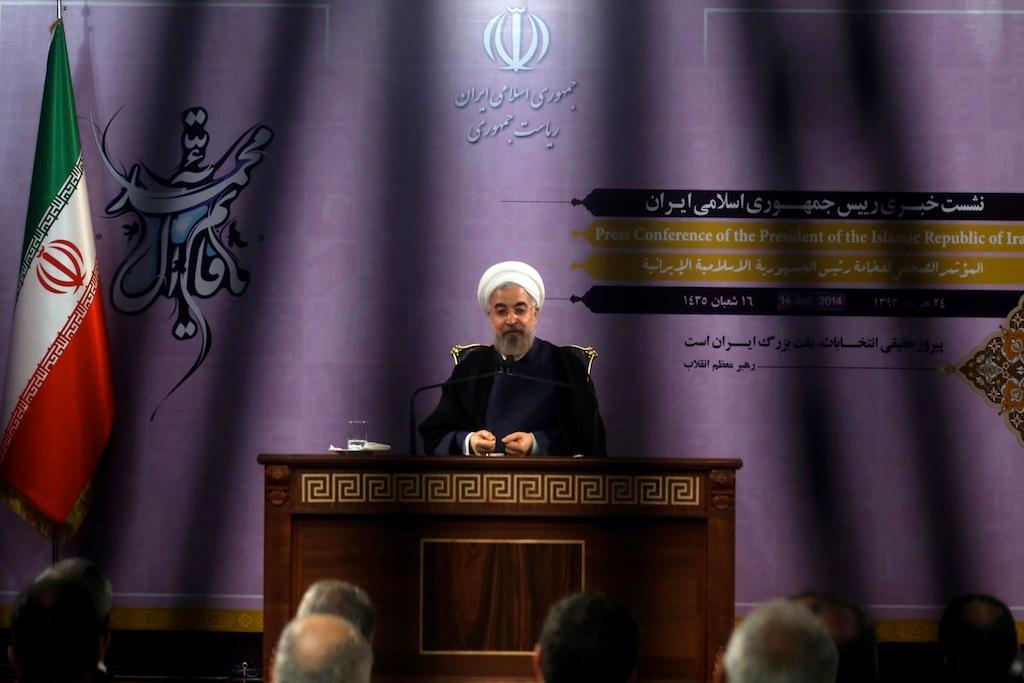Detained Washington Post reporter in Iran is being used as political pawn
Iranian President Hassan Rouhani speaks during a press conference in the capital Tehran on June 14, 2014. Iran may consider cooperating with the United States in fighting Sunni extremist fighters in Iraq if Washington acts against them, Rouhani told journalists.
KABUL — It has now been more than a month since my friends, journalists Jason Rezaian and Yeganeh Salehi, were detained in Iran. No formal charges have been brought against them, and nobody knows where they are or who ordered the arrest.
What does seem clear, however, is that they were not arrested for anything they wrote or reported. Rather, the two seem to be used as pawns in a political struggle, of which not just they but also the Iranian people are victims.
Jason, an Iranian-American citizen, has been The Washington Post’s correspondent since 2012. Yeganeh, or Yegi to friends, has reported for various outlets, including the Emirati newspaper, The National and GlobalPost. Both were formally authorized to work as journalists. They were arrested in their Tehran apartment on July 22 by unidentified plainclothes officers who reportedly went to the effort of trashing the place while they were at it.
As reporters, Jason and Yegi were levelheaded and nuanced in their portrayal of Iran as something more than a bunch of mullahs with a nuclear program. Whether writing about despairing students, football fans or female drug addiction, their work reminds us that Iran is a country of immense complexity, comprised of people of all shades and characters, with their own dreams, hopes and beliefs.
This is not an easy position to take. Hawks on both sides are eager to cast people who try to understand nuances of the other side as apologists for the enemy (For instance, the Wall Street Journal’s Sohrab Ahmari had the bad form to denounce Jason, immediately after his arrest, as being pro-regime).
I met Jason in Iran in early 2012 when he was still a freelancer. I immediately found him to be lavish with his time and advice, and humble with his opinion, despite almost always being the smartest guy in the room. In the often competitive, self-important world of foreign reporting, Jason is bighearted and unpretentious.
He is also an Iranian-American in the best sense of the word. Embodying some of the finest traits of the two peoples, he is generous, has a great sense of humor, and is a brother to his friends.
In Iran, Jason has pursued two personal quests: find avocado to make a decent, much-missed guacamole (failed), and scope out Tehran’s best burger joint (succeeded). More selflessly, Jason has for years advocated for Western travelers to come to Iran. Sanctioned and vilified, Iran is a hermit in the world, and Jason has helped open it up to dreamers and skeptics alike, including Anthony Bourdain and the late Christopher Hitchens, who Jason years ago showed around in the holy city of Mashhad.
Raised in the Bay Area as the son of an Iranian rug man, Jason never seems as much in his right element as in Tehran’s sprawling carpet bazaar. The shopkeeper doesn’t have to move a muscle as Jason kicks back in the chair and explains geographic roots of patterns and changes in knot styles through time.
Yegi has single, Iranian citizenship, but an equally bicultural mind. During Thanksgiving and Christmas celebrations in Tehran, she would be prodding her husband for stories about these traditions. But she is also eager to share her own heritage.
Jason and Yegi were detained as Iran is inching towards an international resolution over its nuclear program. Tourists are starting to trickle back. After the election of Hassan Rouhani, more foreign reporters are receiving visas for short-term visits.
Meanwhile, the human rights situation inside the country remains dismal. 2014 has been a particularly bad year for press freedom in Iran, with scores of journalists detained, including several female reporters.
Iran is rife with internal political battles. Hard-line opponents of the president would love nothing more than to see him fail in his diplomatic venture, and detaining prominent international journalists could be an attempt to embarrass Rouhani.
The fate of detained reporters lies not in the hands of the government but of the judiciary who has called the detention of Jason and Yegi “a security issue.” However, while Rouhani may not be directly responsible, he seems reluctant to confront those who are.
With less than a dozen international media outlets with permission to report from Iran, Jason and Yegi contribute to a deeper understanding of the country. Only a small faction in Iran benefits from the country’s isolation, and hence from detaining reporters like Jason and Yegi. The Iranian people deserve better.
Sune Engel Rasmussen is a journalist based in Kabul, Afghanistan. He previously lived for several years in Iran.
Every day, reporters and producers at The World are hard at work bringing you human-centered news from across the globe. But we can’t do it without you. We need your support to ensure we can continue this work for another year.
Make a gift today, and you’ll help us unlock a matching gift of $67,000!
